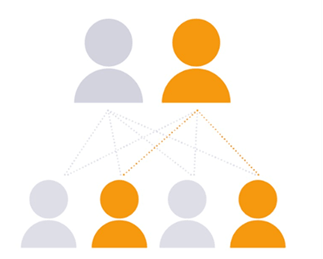What happens after a PHTS diagnosis?
When someone has tested positive for an altered PTEN gene, their doctor will usually want to get detailed information about family medical history and order some tests to explore the extent to which the individual has physical symptoms of PHTS.
This could include a physical examination of the skin, tongue, thyroid and breasts, a urine analysis, scans of the breasts, uterus, thyroid, kidneys, and a colonoscopy to look at the bowel. In children, tests will also be done to identify any developmental issues.
The assessments may vary from person to person depending on several factors, including, age, sex, family history and local guidelines.
How is PHTS managed?
At the moment, there are no formally approved treatments for PHTS.
It is advised that people with PHTS take part in cancer screening (sometimes called cancer surveillance) programmes. This means they will be periodically checked using scans and physical examinations so that any signs of cancer can be spotted and treated as early as possible. Early diagnosis and treatment for cancer can improve outcomes.
The precise approach for cancer surveillance varies by age, sex and the guidelines adopted in different countries.
Other common symptoms and characteristics of PHTS will be monitored regularly and managed as they occur, for example, tracking and supporting milestone development in children, checking skin and mouth for lumps, and looking out for gastro-intestinal problems in case of the development of growths in the gut (polyposis).
Breast examination
Women are encouraged to self-examine their breasts on a monthly basis. Some opt to have their breasts and/or uterus surgically removed to reduce the risk of breast and endometrial cancers. This is an option for women whose breast tissue is particularly dense, making breast screens difficult, or who have had to have repeated biopsies.
For more information see:
Breastcancer.org: Prophylactic mastectomy
National Cancer Institute: Surgery to reduce the risk of breast cancer
NHS: Mastectomy
Which medical professionals look after people with PHTS?
Because the symptoms of PHTS are so varied, different people will see different medical professionals at different times of their life. The doctors involved might include a clinical geneticist, speciality physicians in the areas of high-risk breast care, endocrinology, neurology, gynaecology, oncology, dermatology, and gastroenterology.
If a child is affected by PHTS, a developmental or community paediatrician may be involved alongside other specialists who might include a paediatric neurologist and a paediatric gastroenterologist. A speech therapist, physiotherapist and occupational therapist might be involved to support the child’s development.
What does a diagnosis mean for a family?
A diagnosis of PHTS has implications for the family of an individual and any children they have.
The altered PTEN gene may have been inherited from either one of the parents. If this is the case, the parents, siblings and other close relatives of the diagnosed individual might also be carriers of the altered PTEN gene, with or without symptoms. These family members should be informed of the result so that they can speak to their doctor about getting a gene test regardless of whether they show any of the physical symptoms. If their gene test is negative, they do not have PHTS or its associated health risks.
Alternatively, the diagnosed individual might be the first in the family to carry the gene mutation. This is known as a ‘de novo’ (new) mutation.
Regardless, a person with PTEN gene alteration has a 50 percent, or 1 in 2, chance of passing it on to any child they have.
If you have any questions about the information on this page, please speak to your healthcare provider.
Any individual with a PTEN mutation has a 50%, or 1 in 2, chance of passing it on to any child that they have.

PTEN Research is actively seeking treatments for PHTS by funding research that will increase our understanding of the condition, and assess potential medicines.
Find out more about our research here.
